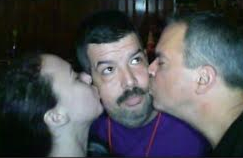“Bully” Reflections

Katherine Bellantone, Donaldson, Vincent Truman
This weekend, I close a production I had been very worried about for the Chicago Fringe Festival. I took a chance on my most personal play to date, and circumstances led to a collaboration amongst a caucasian cast and an African American cast. I advertised the play as a paying gig (and it’s looking 99% favorable I can make good with the artists who did their work, which I’m thrilled about); I thought, “you know, what a dangerous opportunity for audiences to see an experience from 2 completely different perspectives and history.” I am thrilled to say I close feeling ecstatic.
Stage manager-less, but with the assistant director, Baird Brutscher, placed in both casts, thus always backstage and on hand, and rehearsing in my home to cut down expenses (I love paying actors!), the casts assembled a production with little to no standard “leadership” – I’ve always thought of theater as a collaboration, not a dictatorship – but with personalized direction and a trust and belief in the artists’ own abilities. A director is not a director of a play, he is a director for each artist. Of course, I admitted to the casts openly that I have blind spots to the African American experience. Some might call that a red flag; to me, I would feel disingenuous foisting “leadership” when “listening” seemed a better option. And both casts did their best: they worked on two floors, with the cast who had done their homework getting the first half of each rehearsal and the cast needing to run lines were allowed to work in the basement to catch up, and then working with me on the second half.
Chicago Fringe being what it is (predominantly low-budget), I also asked folks to provide their own costumes (since this is not a period piece, this was no big deal – the lead male actor’s costume amounted to a wife beater and jeans) and help create the atmosphere of a garage by bringing a box or two. I brought several boxes and all of the props, including a bike and a chair, despite the fact I have no car. Fortunately, nearly everyone was happy to contribute.
A personal highlight: one of the actors was cast in a show halfway through his commitment to ours, so, whereas most directors would say, “pick the show you want but don’t compromise the other”, including me, I knew losing him would result in his entire cast being jettisoned from the production. I didn’t want that on his head, so we re-arranged the entire schedule for both casts, solely for his benefit, and everyone rolled with it with professionalism. He graciously reimbursed me for the publicity materials already purchased, and all was well.
Most of the actors in both casts worked above and beyond their capabilities, for which I am grateful. For every uncomfortable situation, there were moments when cast members not only knocked it out of the park, but found new ways to knock it out of the park, even during the run.
Did I learn more about the African American experience? Not as much as I’d like, but then I was working with three African Americans, not the entire race, so there was only so much I could glean (I generally shut up when the three of them were talking, instead of inserting my own viewpoint into the conversation, as that was the best way I could be fair throughout the entire process). I gave up on that lofty goal, and instead interacted with them according to their talents. I never got a ‘thank you for your work’, but then that’s a holdover from my more needy days; my journey isn’t to require validation at every turn, so the process turned out to be immensely satisfying. I know I was responsible for some much-needed diversity at the Fringe, and I’m proud of that. A step is a step is a step.
Mind you, I wasn’t too thrilled with some of the critics’ viewpoints, although I grant them latitude because they were seeing three or four shows in a row and I’m sure that’s taxing. However, too often than not, some of the criticism seemed to swear off every single subtext, allegory or analogy I was making and instead clung to the literal “this happened, then that happened” approach. This is theater, folks, not a high school sports event.
Nevertheless, as Jake Baker, one of the actors said when faced with similar criticism, “Fuck ’em. We got this.”
What did I learn ultimately? Regardless of race, sex, orientation, we, as artists, need to continue uniting together, being vocal, and respecting each other. Only then can greatness follow. Thank you, guys, for helping me on my way.
#post-1165 .CPlase_panel {display:none;}



